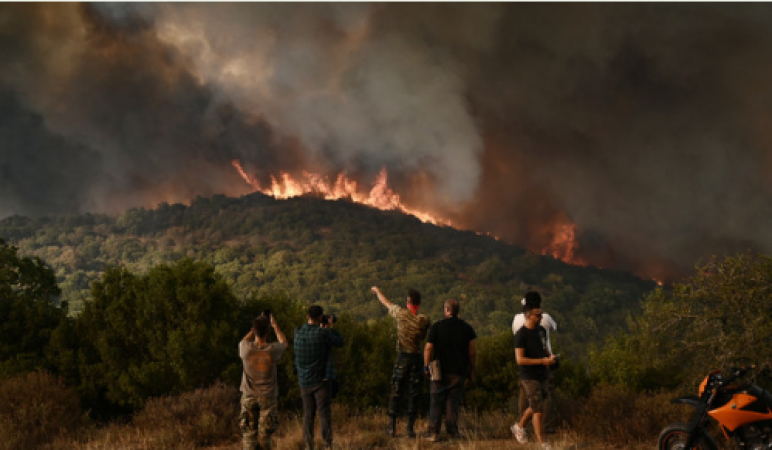
Athens: Greece is grappling with a catastrophic wildfire that has wreaked havoc on a scale comparable to the area of New York City. Originating in the Peloponnese region, located to the south of Athens, the blaze ignited on Tuesday afternoon and rapidly consumed vast stretches of forest and farmland, propelled by fierce winds.
The resultant devastation, totaling an expanse of 150 square kilometers (58 square miles), has led to the evacuation of thousands and left countless homes and businesses in ruins.
As firefighters valiantly battle to contain the ongoing inferno, the circumstances surrounding the fire's ignition remain shrouded in mystery. Authorities are tirelessly investigating the cause of this disaster that has inflicted untold damage upon the affected regions.
Also Read: Biden Administration Targets 10 Drugs for Medicare Price Negotiations in Bid to Lower Costs
The grim spectacle unfolding in Greece stands as the latest chapter in a series of wildfires that have afflicted the nation in recent years. Plagued by a severe drought, Greece's already vulnerable landscape has grown even more susceptible to the ravages of fire, precipitated by the dry conditions and accompanied by strong winds.
The Greek government, in response to this dire situation, has declared a state of emergency in the impacted areas. Acknowledging the magnitude of the crisis, the European Union has extended its offer of assistance to support the efforts of Greek authorities and firefighters.
The aftermath of this fire leaves an indelible mark on Greece, one marked by extensive destruction and displacement. As the assessment of the true extent of the damage unfolds, the grim reality of this disaster comes into sharper focus, emphasizing the immediate need for a comprehensive response to aid the affected communities.
However, this tragedy should not solely be viewed through the lens of its immediate aftermath. It serves as a stark reminder of the perils of climate change, casting a somber light on Greece's precarious position as one of the nations most susceptible to the adverse impacts of climate shifts. As experts predict an escalation in the frequency and intensity of wildfires, the country's vulnerability is poised to exacerbate.
Also Read: Belgium Halts Accommodation for Single Male Asylum Seekers Citing Security Concerns
While the Greek government has endeavored to bolster its capabilities for fire prevention and response, addressing the root causes of this recurring crisis requires more profound action. Climate change, characterized by rising temperatures, prolonged droughts, and heightened weather extremes, looms as a driving force behind the growing wildfire threat.
Efforts to mitigate the impacts of climate change and prevent future disasters should encompass multifaceted strategies. Commitment to renewable energy sources, stringent emission reduction targets, and policies designed to safeguard and restore ecosystems can collectively contribute to tempering the effects of climate change on vulnerable regions like Greece.
In tandem with these global measures, Greece must also intensify its focus on sustainable land management, which includes the prevention of deforestation and the promotion of responsible land use practices. Such initiatives are essential to curbing the circumstances that amplify the risk of wildfires.
The present crisis underscores that the battle against climate change is inherently tied to the preservation of human lives and the protection of our natural world. Urgent global cooperation is required to drive significant change and ensure a safer and more sustainable future.
As Greece grapples with the aftermath of this wildfire, it must seize this moment as a catalyst for transformation. The rebuilding process should prioritize resiliency, sustainability, and adaptation. Collaborative efforts between governments, international organizations, and civil society are pivotal in supporting the affected communities and mitigating the potential for future catastrophes.
In the broader global context, the situation in Greece is emblematic of the urgent need for unified action against climate change. Countries across the world, regardless of their vulnerability, must recognize the interconnectedness of our planet's ecosystems and take decisive steps to address the shared challenge of climate instability.
Greece's devastating wildfire stands as a stark reminder of the destructive power of climate change. As Greece confronts this crisis, it is essential for the nation and the international community to recognize the importance of concerted action to address the root causes of climate-related disasters.
By marshaling resources, committing to sustainable practices, and fostering global cooperation, we can chart a course toward a safer and more sustainable future. The events in Greece highlight that this endeavor is not a choice but an imperative, and the time to act is now.